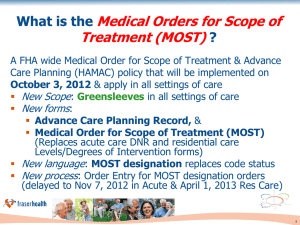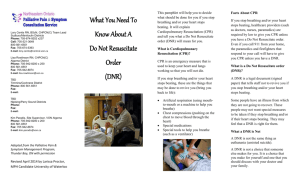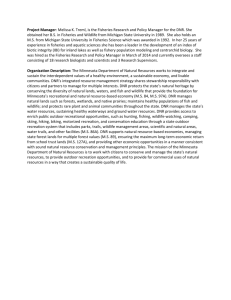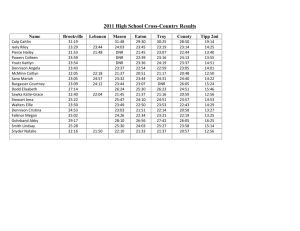What is an Out-of-Hospital Do Not Resuscitate
advertisement
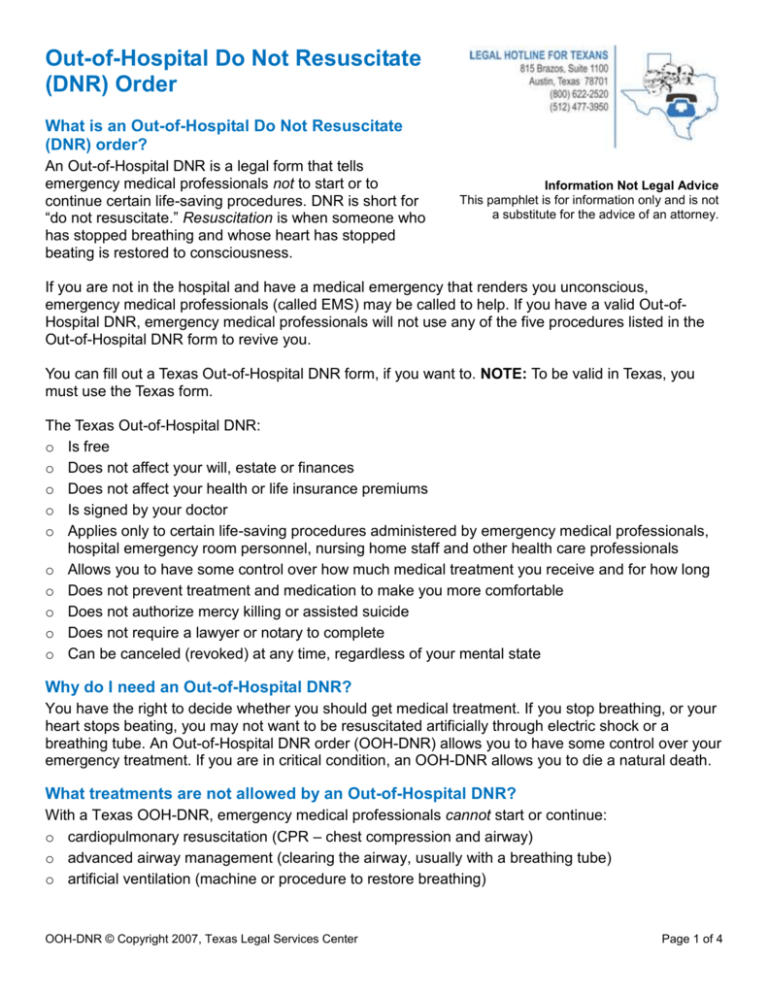
Out-of-Hospital Do Not Resuscitate (DNR) Order What is an Out-of-Hospital Do Not Resuscitate (DNR) order? An Out-of-Hospital DNR is a legal form that tells emergency medical professionals not to start or to continue certain life-saving procedures. DNR is short for “do not resuscitate.” Resuscitation is when someone who has stopped breathing and whose heart has stopped beating is restored to consciousness. Information Not Legal Advice This pamphlet is for information only and is not a substitute for the advice of an attorney. If you are not in the hospital and have a medical emergency that renders you unconscious, emergency medical professionals (called EMS) may be called to help. If you have a valid Out-ofHospital DNR, emergency medical professionals will not use any of the five procedures listed in the Out-of-Hospital DNR form to revive you. You can fill out a Texas Out-of-Hospital DNR form, if you want to. NOTE: To be valid in Texas, you must use the Texas form. The Texas Out-of-Hospital DNR: o Is free o Does not affect your will, estate or finances o Does not affect your health or life insurance premiums o Is signed by your doctor o Applies only to certain life-saving procedures administered by emergency medical professionals, hospital emergency room personnel, nursing home staff and other health care professionals o Allows you to have some control over how much medical treatment you receive and for how long o Does not prevent treatment and medication to make you more comfortable o Does not authorize mercy killing or assisted suicide o Does not require a lawyer or notary to complete o Can be canceled (revoked) at any time, regardless of your mental state Why do I need an Out-of-Hospital DNR? You have the right to decide whether you should get medical treatment. If you stop breathing, or your heart stops beating, you may not want to be resuscitated artificially through electric shock or a breathing tube. An Out-of-Hospital DNR order (OOH-DNR) allows you to have some control over your emergency treatment. If you are in critical condition, an OOH-DNR allows you to die a natural death. What treatments are not allowed by an Out-of-Hospital DNR? With a Texas OOH-DNR, emergency medical professionals cannot start or continue: o cardiopulmonary resuscitation (CPR – chest compression and airway) o advanced airway management (clearing the airway, usually with a breathing tube) o artificial ventilation (machine or procedure to restore breathing) OOH-DNR © Copyright 2007, Texas Legal Services Center Page 1 of 4 o defibrillation (electrical shock to the heart with a defibrillator) o transcutaneous cardiac pacing (electrical impulses to the heart using electrodes attached to the skin) EMS is allowed to provide treatment and pain medication to make you more comfortable. What is the difference between an In-Hospital DNR and an Out-of-Hospital DNR? Both types of DNR orders require your consent and are made part of your medical record. In-Hospital DNR orders are sometimes called “no code” orders. An In-Hospital DNR order tells hospital staff not to resuscitate you. An Out-of-Hospital DNR order instructs emergency medical personnel, hospital emergency room staff, nursing home staff and other health care professionals to not resuscitate you. What is the difference between a DNR, Directive to Physicians, and Medical Power of Attorney? An Out-of-Hospital DNR is signed by your doctor and tells emergency medical personnel not to use certain procedures to resuscitate or revive you. A Directive to Physicians tells your doctor to withhold or withdraw certain life-saving treatment if your doctor certifies that your condition is terminal or irreversible. A Medical Power of Attorney tells another person chosen by you to make health care decisions for you. Your condition does not have to be terminal or irreversible, but that person can act on your behalf only when you are incompetent or cannot make your wishes known to your doctor. Do I need a DNR if I already have a Directive to Physicians? No. If you already have a valid Directive to Physicians, your doctor can rely on it to issue any type of DNR in your behalf. What is required for an Out-of-Hospital DNR? A Texas OOH-DNR form is attached. The Texas form requires your signature, and the signatures of your doctor, and two competent, adult witnesses. One of the two witnesses cannot be: o Your relative (by blood or marriage) o Someone entitled to any part of your estate o Someone with a claim against your estate o Anyone you’ve named to make a treatment decision for you o Your doctor or your doctor’s employee o An employee who cares for you at the health care facility where you are a patient, or o An owner or admissions officer of the health care facility where you are a patient. Your OOH-DNR order must stay with you if you are transported to a hospital. OOH-DNR © Copyright 2007, Texas Legal Services Center Page 2 of 4 When does an Out-of-Hospital DNR take effect? The OOH-DNR form is in effect when you sign it before witnesses. Once signed, the OOH-DNR applies wherever you are located – at home, in a nursing home, in the emergency room, at a clinic, in the grocery store. Texas law says that “Out-of-Hospital” locations also include: o long-term care facilities o in-patient hospice facilities o private homes o hospital outpatient or emergency departments o physician's offices o vehicles during transport Can anyone else issue an Out-of-Hospital DNR for me? Yes. If you are competent you can issue your own OOH-DNR. Your doctor will note in your medical record that you have one. If you are unable to give consent, an OOH-DNR can be issued for you by: o Your legal guardian o Your agent under a Medical Power of Attorney o Your doctor, if you have a Directive to Physician o The following relatives, in order of priority: your spouse your reasonably available adult children your parents, or your nearest living relative If none of the above are available, your doctor can issue an OOH-DNR with the consent of another doctor who is not involved in your treatment and/or is a member of a medical ethics committee. How do I revoke (cancel) an Out-of- Hospital DNR? You can revoke your OOH-DNR at any time by destroying it. You can also tell EMS at the scene that you’ve changed your mind, or let your doctor know that you want to revoke it. It is not in effect if you are pregnant. Where should I keep my Out-of-Hospital DNR? Keep your original OOH-DNR form in a place where the emergency medical professionals can find it easily. An identification bracelet or necklace can prove that you have an OOH-DNR. But in Texas, it must be: o A plastic bracelet with the word “Texas” and the words “Do Not Resuscitate” (or the shape of the State of Texas and the word “STOP” over the shape) o A metal bracelet or necklace with the words, “Texas Do Not Resuscitate – OOH.” Plastic bracelets can be ordered for less than $2.00 from Texas Medical Association ATTN: DNR form 401 W. 15th Street OOH-DNR © Copyright 2007, Texas Legal Services Center Page 3 of 4 Austin, Texas 78701 Order line: 512.370.1306 You can order approved metal identification jewelry from: MedicAlert Foundation, Inc. 2323 Colorado Ave. Turlock, California 95382 888.755.1448 www.medicalert.org American Medical Identifications, Inc. Suite 100 949 Wakefield Houston, Texas 77018 800.363.5985 www.americanmedical-id.com For more information… Contact the Office of the Attorney General of Texas. Ask for the “Advance Care Planning” guide. Senior Texans, P.O. Box 12548, Austin, Texas 78711-2548 Tel. 800.252.8011 In Austin: 512.475.4413 Web: www.oag.state.tx.us/elder Contact the Texas Partnership for End-of-Life Care P.O. Box 80204, Austin, Texas 78708-0204 Tel. 512.453.9600 Email: info@txpec.org Web: www.txpec.org Contact the American Bar Association. Ask for “Consumer’s Tool Kit for Health Care Advance Planning.” ABA Commission on Law and Aging, 740 15th St. NW, Washington, DC 20005 Tel. 202.662.8690 Email: amaaging@abanet.org Web: www.abanet.org/aging To read the law, search on the Internet for Texas Health and Safety Code, Subchapter C, Sections 161.081–166.102 OOH-DNR © Copyright 2007, Texas Legal Services Center Page 4 of 4
